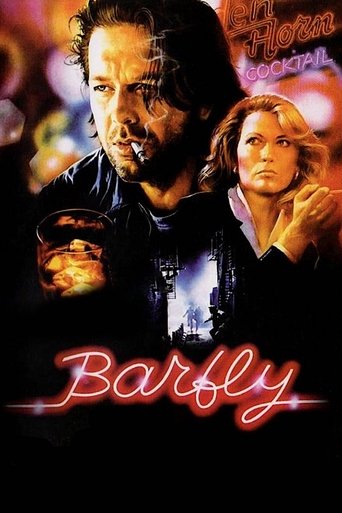Some people never go crazy. What truly horrible lives they must lead.
"Barfly," a 1987 cinematic gem produced by Golan-Globus Productions and The Cannon Group, is a raw and unfiltered dive into the underbelly of Los Angeles' skid row. Directed by Barbet Schroeder and penned by the legendary Charles Bukowski, the film captures the gritty essence of Bukowski's semi-autobiographical narrative. At its core, "Barfly" follows the life of Henry Chinaski, portrayed with captivating authenticity by Mickey Rourke, a struggling writer and alcoholic who finds solace and inspiration in the dimly lit corners of local bars. The film's unflinching portrayal of Chinaski's tumultuous existence, coupled with his complex relationship with fellow barfly Wanda, played by Faye Dunaway, offers a poignant exploration of the human condition. The atmosphere of "Barfly" is palpable, with the smoky, dimly lit bars serving as a backdrop to the characters' existential struggles. The film's setting is not merely a location but a character in itself, reflecting the desolation and desperation that permeate the lives of its inhabitants. The soundtrack, featuring the haunting melodies of jazz and blues, further enhances the film's melancholic tone, drawing viewers deeper into the world of Chinaski and his fellow barflies. The cinematography, with its gritty realism, captures the essence of Bukowski's prose, translating his words into vivid, tangible images that linger long after the credits roll. Mickey Rourke's performance as Henry Chinaski is nothing short of mesmerizing. He embodies the character with a raw intensity that captures Bukowski's spirit, delivering lines with a mix of humor and pathos that resonates deeply. Faye Dunaway's portrayal of Wanda complements Rourke's performance, adding layers of vulnerability and strength to the narrative. Their chemistry on screen is electric, driving the film's emotional core and highlighting the complexities of their relationship. The supporting cast, including standout performances by Alice Krige and Frank Stallone, adds depth and richness to the film, creating a tapestry of characters that are as flawed as they are human. "Barfly" is more than just a film; it is a testament to the resilience of the human spirit in the face of adversity. Through its unflinching portrayal of life on the margins, the film challenges viewers to confront their own perceptions of success, failure, and the pursuit of artistic integrity. Produced by Golan-Globus Productions and The Cannon Group, "Barfly" remains a powerful and enduring work that continues to captivate audiences with its raw honesty and emotional depth. It stands as a tribute to Charles Bukowski's legacy, offering a window into the soul of a man who found beauty in the chaos of life.
Año1987
Presupuesto3000000$
Duración100 minuto
Ingresos3221568$
GénerosComediaDramaRomance
Países de producciónUnited States of America


